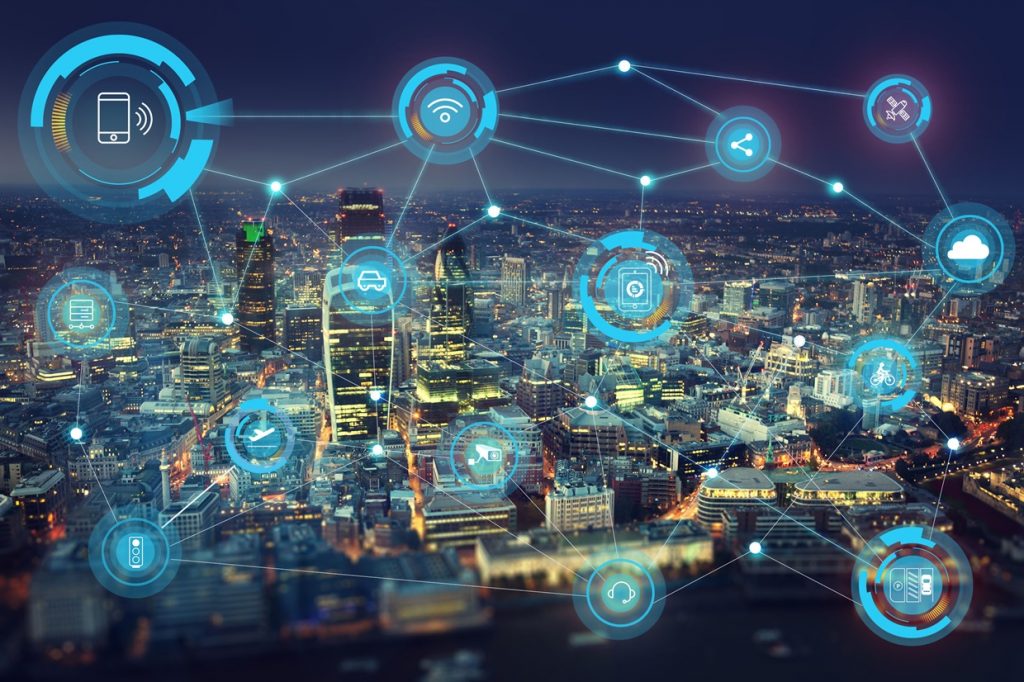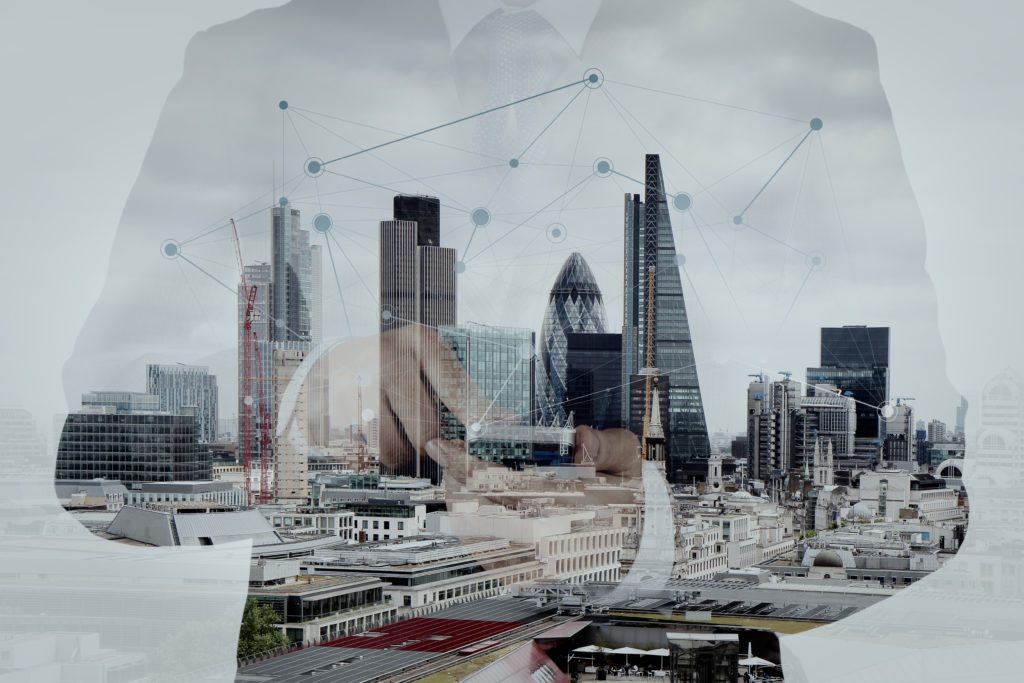The definition of Smart Cities keeps changing from time to time and there’s nothing wrong with that. It’s actually an encouraging sign because it reflects the progress we make with technology in shaping our world and our lives. The term was coined towards the end of the 20th century. Back then its focus was on making user-friendly information available to the public and strengthening the communication channels.
Many cities around the world have already surpassed that stage. The modern concept of smart city emphasises their forward-looking, progressive and resource-efficient nature with a particular focus on improving the quality of life. It’s the latter point that makes us most excited. We know our world is far from perfect and we face a plethora of challenges. If smart cities can help us confront those challenges we all want to have a piece of it, don’t we?
Yet, the benefits of Smart Cities don’t cease to exist there. They have a great deal to contribute to the business world as well and that’s mainly the focus of this blog. We’ll see how businesses can benefit from being in the smart cities, how it lifts their employees’ productivity, spurs innovation and ultimately provides a boost to the economy.
Smart Buildings – Where You Live Is What You Become

Smart Cities consist of smart buildings, homes and office spaces. Businesses operating inside them are at an advantage. Here’s how: Smart buildings are about making useful information available to the staff whenever they need it. They can employ radio sensors to monitor the occupancy of rooms and cabins inside an office building and display helpful signs to employees such as where they can find empty space or where someone they’re looking for can be found.
The comfort of employees is no doubt a crucial factor in deriving the maximum productivity out of them. With smart buildings, connected all over with smart devices, employees can set the most ideal temperature, lighting and even the music to their liking.
Then there’s the safety aspect of the workplace. It’s hard to keep tabs on who’s entering and leaving the office space all the times. But not with Smart Buildings. CCTV cameras are a feature of Smart buildings and they can easily be connected with smart devices. Should you notice anything suspicious, it’ll take only a moment to signal the alarm and have the security team get into action. That’s the physical safety but Smart Buildings also ensure the Digital safety of businesses and prevent them from various online threats of hackings, virus installing or digital theft etc. Smart buildings employ the most advanced digital security measures and it’s difficult to get past them.
Talking of digital, lightning fast internet is something one is sure to find at smart buildings. That ensures you can receive and respond to all the dealings of your business in a prompt and timely manner.
Sustainability – Everyone Does Their Bit

The global population is increasing at a rapid pace and that’s a cause for concern. The danger of the depletion of our natural resources is very real and to counter that we have to find sustainable solutions. Apparently, Smart Cities can help us with that too. Smart cities are designed in such a way so as to find sustained solutions to the greater environmental and societal challenges. The benefits arising out of the Smart Cities are there to be enjoyed by the business world as well.
Businesses that operate under the smart city models have to become compliant with the standards that everyone has to follow and that opens the door for them to become more favorable to the public. Many studies have confirmed in the past that people are willing to pay extra for a product or service of a company that’s engaged in the social and environmental change. Human psychology works in wonderful ways. Smart cities also contribute to an increased sense of responsibility on things such as disposing of waste, proper energy utilization as well as the ethical treatment of the employees.
Smart Economy – Data Drives The Decision

The state of the art technologies and the enterprises to support the Smart cities can give a huge boost to the economy. Smart cities operate a great deal on the data. Data that’s gathered from day to day experiences, in real-time and from tens of thousands of people. Now, businesses that operate in the smart cities can gain access to this data and use it to improve their services, understand their target users and even the places where their services are offered. Tourism industry is the perfect industry to take advantage of this opportunity. By collecting data on tourists of their visits, how much time it takes them to get from one place to another, how long one has to wait for public transit and the easiest routes etc. they can offer a highly insightful data to the end user that gain their loyalty.
Smart Cities Drive Innovation

Adaptation is the key to growth. For the cities to remain sustainable, effective and perform at their ultimate best they have to be constantly upgrading the technologies and strategies that drive them forward. The demand for new solutions across all the industries is at an all-time high. People demand comfort and simpler solutions to complex problems. The answer no doubt lies in innovation – the driving force behind every major development.
As businesses show urgency to find smart solutions to everyday problems, it also opens up career opportunities for people wanting to make a difference with their innovative ideas. In smart cities everyone is connected, each entity contributes to the growth and development of the other. Innovation happens when we’re probing and testing out ideas to find better solutions. Smart Cities offer a perfect environment to achieve that.
Smooth Travel And Cost Saving

Unfortunately, urban cities, holding more population and in turn more vehicles, have to bear the brunt of inefficient transport systems that result in road accidents, more congestions and everyone getting late for wherever they’re headed. Stats like an average driver spends 15% of their driving time caught up in congestion and 20% searching for parking spaces are just appalling. Businesses more than any other suffer the most. There’s nothing worse than having employees showing up late, distressed and in a weary state at work all because of the unpleasant commute they had to undertake to reach the work.
That can be avoided with a smart transport system that factors in all possible transportation scenarios. Revamping a city’s infrastructure is a huge part of a Smart City’s attempt towards attaining efficiency and sustainability. Smart Cities allow for safe, smooth and swift travel from one place to another. This also ensures that businesses can have their employees at work on time and ready to perform at their best.
Final Thoughts
The trend of urbanization doesn’t seem like it’s going to stop anytime soon and we have a problem if things continue to take place in the same alarming manner. Small spaces, crammed with people, inadequate facilities and irresponsible utilization of resources are wreaking havoc on the environment. Smart Cities are a ray of hope and we need to invest in them if we want a more organized, safe and happy environment around us.
The importance of such an environment is huge for businesses that need more focus on their core operations. As human beings, we are impacting by pretty much everything we encounter in our day to day lives. Unpleasant experiences make us sad and good experiences make us happy and cheerful. It’s commonly agreed that people are more productive when they’re happy. So, businesses need happy people with fewer worries. Smart cities go a long way to ensure that. With a wealth of data, that helps us understand our needs, struggles and difficulties we can work out solutions that contribute to our growth as a society. In the end, we can safely conclude that Smart Cities drive the business growth, help them achieve sustainability, gain more profits and eventually give a boost to the economy.







Mandeep Singh, thanks so much for the post.Much thanks again. Really Cool.